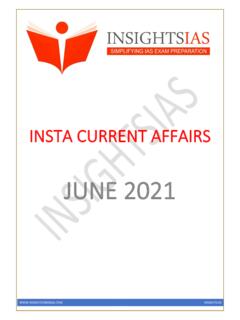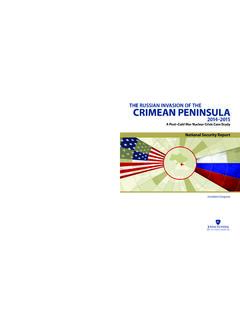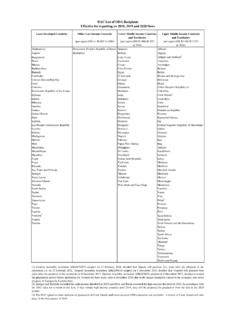Transcription of Focus Group Interview as a Tool for Qualitative Research ...
1 Pakistan Journal of Social Sciences (PJSS) Vol. 33, No. 1 (2013), pp. 191-198 Focus Group Interview as a Tool for Qualitative Research : An Analysis Rana Muhammad Dilshad Assistant Professor, Department of Education, The Islamia University of Bahawalpur, Bahawalpur, Pakistan. E-mail: Muhammad Ijaz Latif Chairman, Department of International Relations, The Islamia University of Bahawalpur, Pakistan. E-mail: Abstract Focus Group Interview is one of the valuable tools for collecting Qualitative data. In view of extensive literature on the subject, this paper examines the background, purpose, rationale, and various forms of Focus groups to be used in Qualitative Research .
2 Characteristics of moderator, major phases and criteria of successful Focus groups have also been discussed. It is concluded that the Focus groups, compared to other techniques, may yield shared understanding and several perspectives of a given topic if they are conducted by well-trained efficient researchers. Keywords: Qualitative Research ; Data analysis; Research tool; Focus Group ; Group composition I. Introduction Interview is a specialized form of communication between people for a specific purpose associated with some agreed subject matter (Anderson, 1990, ).
3 As the purpose of the Research Interview is to obtain Research -relevant information from the interviewee, it is centred on the evidence to be generated for achieving the Research objectives of describing, predicting or explaining the phenomenon (Cohen & Manion, 2007). As compared to other techniques of data collection questionnaire, observation, etc., Interview may serve as a rich source for exploring people s inner feelings and attitudes. According to Wisker (2001), the use of Interview is highly desirable for obtaining information based on i.
4 Emotions, feelings, experiences, ii. sensitive issues, and, iii. insider experience, privileged insights and experiences. The technique of Interview is of immense use and value in Qualitative Research studies since they emphasize the in-detail and holistic description of activity or situation. By definition, the Qualitative Research is designed to investigate the quality of relationships, activities, situations or materials (Fraenkel & Wallen, 2003, ). Therefore, the Qualitative interviews differ significantly from those used in quantitative Research .
5 The Qualitative Research interviews endeavor to appreciate the world from the respondents perspective and to explore the significance of people s experiences (Kvale, 1996). 192 Pakistan Journal of Social Sciences Vol. 33, No. 1 II. What is Focus Group Interview ? Focus Group or Focus Group Interview is a Qualitative technique for data collection. A Focus Group is a Group comprised of individuals with certain characteristics who Focus discussions on a given issue or topic (Anderson, 1990, ) According to Denscombe (2007, ), Focus Group consists of a small Group of people, usually between six and nine in number, who are brought together by a trained moderator (the researcher) to explore attitudes and perceptions, feelings and ideas about a topic.
6 A Focus Group Interview provides a setting for the relatively homogeneous Group to reflect on the questions asked by the interviewer. Discussing the history of Focus groups, Rice and Ezzy (1999) point out that Bogadus in 1926 initially explained Group interviews in social science Research . During the World War II, Merton also used Focus groups as the means for analyzing people s responses about war-related propaganda and the efficacy of the soldiers training contents.
7 In 1950s, the market researchers began to use this technique to collect more accurate information about the consumer product preferences. (Anderson, 1990; Denscombe, 2007; Patton, 2002; Wisker, 2001). Since then, the use of Focus groups spread extensively to social Research . However, Rice and Ezzy (1999) maintain that in the period from 1950 to 1980 Focus Group practically vanished from the disciplines of social science. The major reason for this, Morgan (1997) argues, was the fact that this method was largely ignored by the original proponents and other researchers who favoured other techniques generally.
8 However recently Focus groups have become popular among the Qualitative researchers in social sciences. III. Characteristics of Focus Group Interview According to Casey and Krueger (2000), Focus Group provides a more natural environment than that of individual Interview because participants are influencing and influenced by others- just as they are in real life ( ). The three distinctive characteristics of Focus groups, identified by Denscombe (2007), are as follows: i.
9 Prompt/Stimulus: The sessions usually revolve around a prompt, a trigger, some stimulus introduced by the moderator in order to Focus the discussion. ii. Moderator-not a Neutral Person: There is less emphasis on the moderator to adopt a neutral role in the proceedings than is normally the case with other Interview techniques. iii. Interaction within the Group : Interaction between Group members is given a particular value rather than just gathering opinions of people. The collective view is given more importance than the aggregate view.
10 IV. The Purpose and Rationale Focus Group Interview aims at collecting high-quality data in a social context (Patton, 2002), which primarily help understand a specific problem from the viewpoint of the participants of Research (Khan & Manderson, 1992). The question as to why and when Focus Group Interview should be used is very important. Firstly, Focus Group Interview may be a valuable Research instrument when the researcher lacks substantial information about the subjects.




